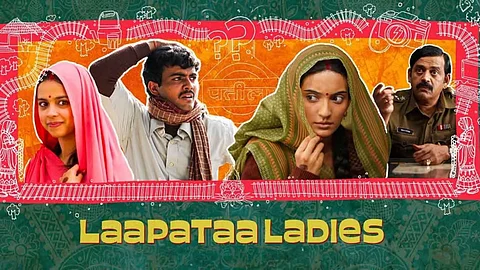
- HOMEGROWN WORLD
- #HGCREATORS
- #HGEXPLORE
- #HGVOICES
- #HGSHOP
- CAREERS
- ABOUT US
- CONTACT US

The latest discourse on feminism seems to be a strong divide between trad wives and those who challenge the institution of marriage entirely. There are forces that push women towards both of these choices. Marriage proposed to be the destination of a girl has existed since ages with Indian concepts like 'paraya dhan' whereas the rise of feministic values has also led to a bit of an extremism that views marriage as unpaid labour and boycotts it entirely. Both of these polar opposites have one thing in common - the lack of agency.
Kiran Rao's comeback movie, 'Laapataa Ladies', lays bare the intricacies of both sides of the argument in a poignant narrative of identity, and womanhood against patriarchy where two women go through an unassuming journey of self-discovery.
The film is set in the fictitious Nirmal Pradesh. This region mirrors the cultural landscape of the Hindi heartland, where gender discrimination is entrenched, and a forthright woman is often derogatorily labeled as a 'lady.' Without resorting to overt feminist slogans, Rao subtly exposes the deep-seated patriarchy that pervades this society.
Laapata Ladies begins with a seemingly simple yet profound premise. Two veiled, newlywed brides, Phool Kumari and Jaya, get swapped during a train journey, their veils symbolizing both literal and metaphorical barriers. The film, set in a time when mobile phones were a rarity and a prized dowry item, uses situational humour to draw viewers in. As the story unfolds, however, it becomes clear that the narrative is anything but simplistic. Through irony and satire, Rao critiques the social and cultural norms that confine women.
Phool Kumari, portrayed by Nitanshi Goel, is a naive bride who finds herself stranded at a remote railway station. Her journey contrasts sharply with that of Jaya, played by Pratibha Ranta, an educated and independent-minded bride who ends up in the wrong village. Their paths, while divergent, converge in a quest for identity and dignity. Phool's initial reaction to her predicament is to hide behind a dustbin labeled "use me," symbolizing her conditioned belief in her own disposability within a patriarchal structure.
Jaya, on the other hand, represents the emerging cracks in this structure. Her escape from the traditional confines is depicted as a breakthrough, likened to a sheaf of grass finding its way through a crevice in the rock of tradition. These two characters embody different responses to the same oppressive system: one initially submissive and the other inherently rebellious.
The film also explores the dynamics between the two types of men Phool and Jaya encounter. Deepak (Sparsh Shrivastava) is progressive and supportive, while Pradeep (Bhaskar Jha) is deeply rooted in regressive values. Their interactions with the brides highlight the contrast between modern and traditional masculinity and its impact on women's lives. This dichotomy is one of the factors that divides women for and against marriage systems.
A significant character in the film is Manju Maai (Chhaya Kadam), a single woman running a stall at the railway station. She becomes a mentor and a source of wisdom for Phool, representing a voice of reason amidst the chaos. Manju’s interactions with Phool are emblematic of the broader conversation between the creator and the creation, where both learn and grow from each other. Ravi Kishan delivers a standout performance as a morally conflicted police officer, adding depth and texture to the narrative. His character represents the nuanced portrayal of individuals within a corrupt system who still retain a semblance of conscience.
While the film is set in 2001, its themes resonate with contemporary issues. The film addresses the ongoing struggle for women's education and independence in a society where political promises of development often fall short of real progress. The period setting allows for a nuanced exploration of these themes, making the film a timeless commentary on gender and societal norms.
Laapata Ladies does not merely present a critique of societal norms but also offers a vision of empowerment and self-discovery. The film's symbolism of the ghunghat (veil) is particularly poignant. Traditionally a marker of modesty and subjugation, the veil in Rao’s narrative becomes a metaphor for the constraints placed on women. As Phool and Jaya through their respective journeys, they come our of the veils reclaiming their spaces, and asserting their identities.
